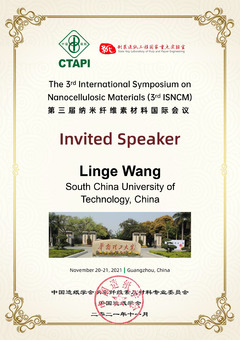
Conference Guide(参会指南): https://isncm2021.aconf.org/news.html
November 19-21, 2021 | Guangzhou, China

Start Time:2021-11-21 11:00 (Asia/Shanghai)
Duration:25min
Session:[SA] The 3rd International Symposium on Nanocellulosic Materials-Oral Session (ROOM 1)) » [S4] Oral Session 9 & 10
Tips: The file permissions under this presentation are private. You have not logged in yet and cannot view it temporarily.
Professor Linge Wang of South China University of Technology (SCUT) is currently the Associate Dean of South China Advanced Institute for Soft Matter Science and Technology, and the Associate Dean of School of Molecular Science and Engineering. He received his PhD in Chemistry from the Institute of Chemistry, Chinese Academy of Science (CAS) in 2003. He had worked at the Guangzhou Institute of Chemistry, CAS as an Assistant Professor (till 2004), Associate Professor (till 2008), and then worked at the University of Sheffield (till 2012) as a Postdoc Research Associate. He was pointed as a full professor at SCUT since Sep 2012. His research focuses on Soft Matter, particularly on polymer nanofibres, polymer vesicles, polymeric optical film, tissue engineering, cell therapy, drug delivery. He has received more than RMB 10 million in research funding as a PI. His research has been published in leading journals in a variety of materials and polymers, such as Advanced Materials, Angewandte Chemie International Edition, Macromolecules, Applied Energy, Soft Matter; has been invited to write 3 book chapters and has published 14 patents. Professor Wang is a senior member of Chinese Chemical Society, a member of Chinese Society of Cellulose and Renewable Materials, and also a member of the China Spallation Neutron Source Science and Technology Committee.
Comment submit